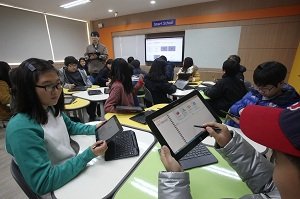
The need for educational and communicational devices in schools has been recognized by educational systems in a number of countries, including Turkey, Kazakhstan, Indonesia, Senegal, Colombia, Finland, Sweden, the US and many more. While the governments are into centralized “tabletization” of educational institutions, many students have portable devices on their own. For example, in 2013, there were around 260,000 tablet users among students in the UK and ten times as many in the US. Still, not everyone owns a tablet for education, especially in the developing countries, which is why governments are planning to buy or lease tablet devices for schools.
A tablet computer is a universal device which has a lot of advantages compared to both textbooks and computers. For a start, it is relatively small and fits into a student’s bag. Its size makes it possible for younger school pupils to carry it around. A tablet is not a tool on its own, but it rather offers a number of built-in possibilities to utilize in school. For example, it is a combination of a notepad, calendar, storage for e-books, recording tool, and a platform for a variety of education-specific apps. The latter are getting increasingly popular on the market of mobile applications. What’s more, tablets can be used by teachers to maintain constant interaction with colleagues as well as students thanks to conference calls, real-time messengers, or even email. Additionally, tablets match the current lifestyle of young people who are always on the go and are used to access information permanently.
The use of tablets in schools can change the studying process entirely. Everyone in the class can create notes or take instant photos, and then exchange these notes and learning materials within a particular app which is installed on all devices. Video or voice recording tools can facilitate the learning process as well, and it especially concerns language learning. By recording his or her pronunciation, a student can work on his or her own mistakes. The use of subject-specific apps, educational databases, or digital textbooks provides access to an infinite number of information sources.
Tablet computers have a tremendous potential as an educational tool. They cover all aspects of educational process, including acquisition of information, its processing and storage, communication with teachers or peers, access to a range of resources, conducting research, and others. The number of students who possess tablets increases every year globally and not only in the developed countries. More and more officials with educational systems around the world recognize the trend and are ready to support schools in acquisition of tablets. So, expand your tablet purposes, use it for your benefit.
